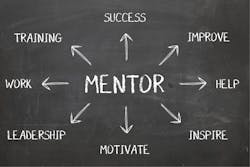We have a small window that is closing fast. The first baby boomers are 70 and the last ones will reach retirement in only 15 years. Our successors are taking over or are in training to take over. We want them to be successful.
It is our job, our responsibility, even our duty, to accelerate the development of leadership. If we do this to the best of our ability, our successors will be ready.
This upcoming group is smart and tech savvy. They are better prepared for automation and deep-level computer control than we are.
It is not primarily knowledge that we need to impart, nor skills and abilities, although this certainly is important.
We need to transmit something of our attitude, our judgment and of our pride in good products and in solid machines.
There are already classes in knowledge, skills, processes and procedures. There are very little programs available about attitudes, judgement and pride.
Mentor
One antidote is personal. It is called mentoring. Mentoring is a special relationship between a senior person (the mentor) dedicated to the business and development of the person being mentored.
The story of Mentor comes from Homer's Odyssey. It is the story of Odysseus’ 10-year trip home after the fall of Troy. When Odysseus, king of Ithaca, went off to fight the Trojan War, he entrusts the care of his household to Mentor, who serves as teacher and overseer of Odysseus’ son, Telemachus.
The word “mentor” evolved to mean trusted advisor, friend, teacher and wise person.
According to Emory University’s Learning and Organizational Development: “Mentoring is a fundamental form of human development where one person invests time, energy and personal know-how in assisting the growth and ability of another person.”
What They Do
Mentors provide counsel. They might advise patience when that is needed or action when that is needed.
Mentors teach a person to “see” and properly evaluate reality. They provide context for what is going on at the company. They afford a big picture view to help the mentee understand a current crisis more clearly. They can be a mirror so that the mentee can “look” and see themselves in the future.
Furthermore, mentors help the mentee be prepared and help them avoid being blindsided by events or people.
Mentors listen deeply and powerfully to the mentee. Listening closely, and without filters or concerns (sometimes called innocent listening), will cause the mentee to get stronger and mature.
This kind of listening is like putting fertilizer on a garden. It makes it grow.
Mentors show confidence in the mentee. Sometimes the only thing a person needs is for someone to believe in them. In the movie Joy, the only person that believed in Joy was her grandmother. In the face of universal negativity in Joy’s family, her grandmother’s confidence was enough to carry her through.
Mentors also make introductions to people who might be useful to the mentee, provide resources for projects and help create and manage opportunities.
Benefits
A well-mentored person has an increased comfort level in their job and life. This comes from the enhanced relationship with reality. Plus, they tend to be more effective than they once were.
Their increased effectiveness comes from knowing what is important and what is less important.
All of this tends to enable them to have more fun at work
For the mentor, there is a feeling of satisfaction from making a contribution to someone’s life.
For my next column, I will discuss how to get started as a mentor.
Joel Levitt is director of international projects for Life Cycle Engineering (www.lce.com), an organization that provides consulting, engineering, applied technology and education solutions that deliver lasting results. Previously, he was president of Springfield Resources (www.maintenancetraining.com), a management consulting firm.
About the Author

Joel Levitt
President, Springfield Resources
Joel Levitt has trained more than 17,000 maintenance leaders from more than 3,000 organizations in 24 countries. He is the president of Springfield Resources, a management consulting firm that services a variety of clients on a wide range of maintenance issues www.maintenancetraining.com. He is also the designer of Laser-Focused Training, a flexible training program that provides specific targeted training on your schedule, online to one to 250 people in maintenance management, asset management and reliability.
